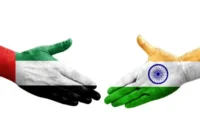By failing to crack down on all terrorist groups operating in the country, Pakistan runs the risk of becoming embroiled in a serious conflict with India.
In January, the complexity of South Asia’s security dynamics once again came into full view. The new year was barely more than a day old when a group of Pakistan-based jihadists slipped into a major Indian air base at Pathankot and engaged in a multiday firefight that left at least seven security personnel dead and wounded about 20 more. The attack came less than a month after US Deputy Secretary of State Antony Blinken warned of the possibility of “an unintentional conflict” between New Delhi and Islamabad sparked by a terrorist strike.
India places blame for the assault on a militant outfit called Jaish-e-Mohammad (Army of Mohammad), which is also thought to have played a role in the brazen December 2001 terrorist attack on the Indian parliament—an event that ignited a months-long military confrontation between India and Pakistan.
Two weeks after the Pathankot attack, another jihadist band snuck across the border from Afghanistan and massacred at least 20 students and teachers at a university in Charsadda in northwestern Pakistan—close to the country’s tribal belt, a notoriously lawless area festooned with all kinds of extremist organizations. Responsibility for the attack was claimed by a faction of the Pakistan Taliban that had carried out the horrific December 2014 slaughter of some 140 children at a school in nearby Peshawar that is managed by the Pakistani army.
Both attacks in January 2016 were conducted at widely-separated locations by two different jihadist networks with distinct agendas. Jaish-e-Mohammad (JeM), which benefits from links with Pakistani security services, is focused on wresting control of the Indian portion of Kashmir away from New Delhi. The Pakistan Taliban, on the other hand, directs its energies to attacking the institutions of the Pakistani state.
But both groups share a few similarities. First, they find shelter in cross-border sanctuaries, effectively placing them beyond the retaliation of the aggrieved countries. JeM has been officially banned in Pakistan since 2002, but nonetheless maintains an open presence in the country’s Punjab heartland. Indeed, Pakistani authorities have attempted in recent years to build up the organization in an attempt to diminish the Pakistan Taliban’s ideological appeal and lure away its foot soldiers.
In contrast, the Pakistani army has mostly driven the Pakistan Taliban out of the country. But the group has found refuge in Afghanistan, in connivance with Afghan officials seeking to pay Islamabad back for its patronage of the Afghan Taliban. A senior Pakistan Taliban leader recently conceded to a Western journalist that, “In Pakistan we can hardly operate anymore. In Afghanistan, we have no problem going anywhere.”
Sorcerer’s Apprentice
A second similarity between JeM and the Pakistan Taliban is that they are manifestations of what can be called the “Sorcerer’s Apprentice” problem. Named after Johann Wolfgang von Goethe’s classic tale about the dangers of conjuring up proxies one cannot ultimately control, this challenge refers to the large number of jihadist outfits that Pakistan has fostered over the years, but which have either now turned their fury against Islamabad or conduct unilateral operations that undermine Pakistani strategic interests.
As this author noted in an earlier article for Fair Observer, the Pakistan Taliban is perhaps the paramount example of the Sorcerer’s Apprentice problem. It has mounted significant attacks against the Pakistani military establishment since emerging in the wake of the July 2007 storming by the Pakistan army of a leading mosque in Islamabad that had become a center of anti-government militancy. Among a long tally of terrorist incidents, the group is responsible for the October 2009 assault on the Pakistani army’s main headquarters, as well as assassinating a number of generals.
JeM exemplifies the other side of the Sorcerer’s Apprentice challenge: Militant groups protected by the Pakistani state that, nonetheless, see derailing good relations and even triggering unintended war between New Delhi and Islamabad as a way to advance their own interests. As Husain Haqqani, a former Pakistani ambassador to the United States and a prominent critic of his country’s links with terrorist groups, concedes: “The Pakistan Army feels like they can control these groups, but they have a mind of their own.” Similarly, an Indian security official recently acknowledged that: “It has been clear for some time that there is no [jihadist] group that is fully within [Pakistan’s] control. They are all itching for independent action, some want to have a go at us immediately.”
JeM, for instance, had a hand in the 2001 Indian parliament attack that led to a near-war crisis between the two countries. Yet it appears the attack was not sanctioned by the Pakistani leadership, but rather was a jihadist effort to divert Pakistani military attention away from the Afghan border precisely when Osama bin Laden and hundreds of al-Qaeda and Taliban fighters were fleeing out of Afghanistan following the Taliban regime’s demise in late 2001. Indeed, the signals traffic in the immediate aftermath of the parliament strike between Pakistan’s chief intelligence agency and the jihadists responsible for the attack indicated real anger on the part of the Pakistani military establishment.
India’s Response
Similarly, JeM’s attack on the Pathankot air base in January, which occurred just a week after Indian Prime Minister Narendra Modi’s surprise trip to Lahore—the first visit by an Indian leader to Pakistan in 12 years—is widely thought to be aimed at torpedoing the nascent diplomatic engagement between New Delhi and Islamabad.
One of the surprising and under-noticed aspects of the Pathankot assault is the internalization by Modi’s government of the “Sorcerer’s Apprentice” problem. This development seemed most unlikely as recently as last summer. During his 2014 election campaign, the prime minister presented himself as a tough-minded leader on the issue of Pakistan-based terrorism and regularly lambasted his predecessor’s passivity following the 2008 Mumbai terror strike. “They did nothing,” Modi exclaimed. “Indians died and they did — nothing.” He pledged that once in office he would talk to “Pakistan in Pakistan’s language, because it won’t learn lessons until then.” At another campaign event, he promised to pursue a “zero-tolerance policy” on terrorism.
Likewise, Modi’s national security advisor, Ajit Doval, has argued that “effective deterrence” is key to dealing with Pakistan and promised a muscular response to cross-border terrorism. Defense Minister Manohar Parrikar has beat the same drum.
Yet when it was confronted by the Pathankot attack—the most serious cross-border terrorist strike to have occurred on its watch so far—the Modi government’s reaction was remarkably restrained. This is hardly the response one would expect from a prime minister who promised a more vigorous approach toward national security and vowed to talk to “Pakistan in Pakistan’s language because it won’t learn lessons until then.” Nor is restraint something one would anticipate from a government that reveled in jingoistic boasting less than a year ago when it went after militant sanctuaries in Myanmar. The most that New Delhi has done is postpone a previously-scheduled round of diplomatic talks with Islamabad, although even this was done in an amicable manner.
For its part, Pakistan has absorbed at least part of the Sorcerer’s Apprentice lesson. Following the Pakistan Taliban’s attack on Karachi’s international airport in 2014, the army launched a wide-ranging offensive in the tribal areas, which has caused the Pakistan Taliban to flee into Afghanistan. The country’s overall security situation has greatly improved over the past 18 months, including in Karachi, its largest city that has been aflame in political violence for decades.
The Pakistani government vows to make no distinction in its crackdown between the various stripes of jihadist groups. But so far, its efforts have been almost entirely at the outfits waging war against itself while sparing those with an anti-India agenda, including JeM. As long as this continues, Islamabad runs the risk of becoming embroiled in a serious conflict with New Delhi that it did not intend.
The views expressed in this article are the author’s own and do not necessarily reflect Fair Observer’s editorial policy.
Photo Credit: OlegD / Asianet-Pakistan / Shutterstock.com
 We bring you perspectives from around the world. Help us to inform and educate. Your donation is tax-deductible. Join over 400 people to become a donor or you could choose to be a sponsor.
We bring you perspectives from around the world. Help us to inform and educate. Your donation is tax-deductible. Join over 400 people to become a donor or you could choose to be a sponsor.
Support Fair Observer
We rely on your support for our independence, diversity and quality.
For more than 10 years, Fair Observer has been free, fair and independent. No billionaire owns us, no advertisers control us. We are a reader-supported nonprofit. Unlike many other publications, we keep our content free for readers regardless of where they live or whether they can afford to pay. We have no paywalls and no ads.
In the post-truth era of fake news, echo chambers and filter bubbles, we publish a plurality of perspectives from around the world. Anyone can publish with us, but everyone goes through a rigorous editorial process. So, you get fact-checked, well-reasoned content instead of noise.
We publish 2,500+ voices from 90+ countries. We also conduct education and training programs
on subjects ranging from digital media and journalism to writing and critical thinking. This
doesn’t come cheap. Servers, editors, trainers and web developers cost
money.
Please consider supporting us on a regular basis as a recurring donor or a
sustaining member.
Will you support FO’s journalism?
We rely on your support for our independence, diversity and quality.







